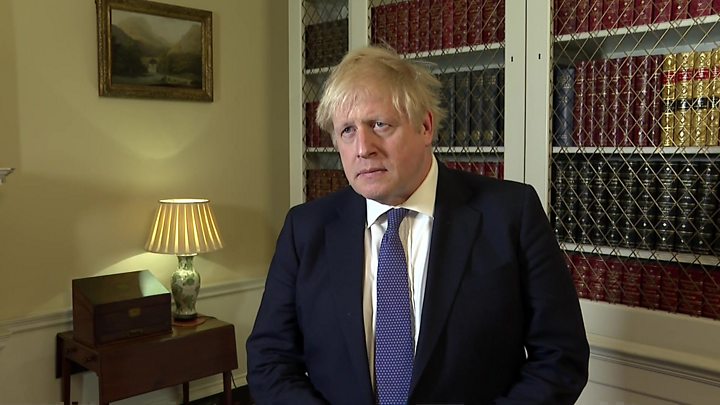Three more people from England have tested positive for coronavirus, taking the total number of UK cases to 23.
Two of the patients had recently returned from Italy, while the other had come back from Asia, chief medical officer Prof Chris Whitty said.
The cases are from Gloucestershire, Hertfordshire and Berkshire.
An infant school in Berkshire has issued a statement saying one of its members of staff had tested positive for the virus.
Willowbank Infant School, in Woodley, tweeted: "We understand that this will worry many of you, and can reassure you that we have taken advice from Public Health England.
It added: "The school will be shut for some days to allow for a deep clean and to ensure that the risks of infection remain low."
It comes as health officials try to discover how a man from Surrey caught the virus, after he became the first person to be infected within the UK.
The man, who is being treated at Guy's and St Thomas' Hospital in central London, had not been abroad recently - unlike the other cases in the UK.
Officials are trying to trace people who had contact with him. Haslemere Health Centre, which he had attended, has now reopened after "deep cleaning".
A pub in Haslemere, called the Prince of Wales, also closed for a deep clean as "a precautionary measure". A sign outside the pub said that "a customer who visited us has tested positive for coronavirus".
Ten more cases of the virus in the UK in just over two days might raise eyebrows, but health officials say all but one can be easily explained because the patients have travelled from the most affected countries, including Northern Italy and Iran.
Since the first UK cases were confirmed in York - two Chinese nationals - positive tests have been recorded in the south of England, Derbyshire, south Wales and Northern Ireland.
Of potential concern is the case in Surrey, a man who had not travelled abroad.
Public health officials are tracing his contacts to see if his infection can be explained by another individual who has arrived in the UK from abroad.
The government is next week expected to publish emergency legislation to help tackle the virus.
The package of measures would be designed to help the public sector - such as the NHS and schools - cope with a serious rise in cases.
There are few details about what the measures could involve - but school class sizes in England is one area which would be addressed. They would be permitted to rise above statutory limits, in the event of widespread teacher absences.
Health minister Edward Argar told BBC Radio 4's Today programme that "any responsible government" would have "contingency planning" in place, but added the government was "entirely focused on making containment work".
He said the contingency plans "are not needed at the moment".
Prime Minister Boris Johnson, who said the virus outbreak was now a top priority, will chair a meeting of the government's Cobra emergency committee on Monday.
He had faced criticism from Labour, who said he needed to "get a grip" on the situation and questioned why he was waiting until next week to hold the meeting.
Downing Street said the prime minister had spoken to Health Secretary Matt Hancock and Prof Whitty, the chief medical officer, on Saturday and was receiving regular updates.
"Everything possible is being done to limit the spread and make sure government departments and public services are prepared," Downing Street added.
As of 09:00 GMT on Saturday, more than 10,000 people in the UK had been tested for coronavirus.
In other recent developments:
- The Foreign Office has called on Iran to "immediately allow" health officials to examine Nazanin Zaghari-Ratcliffe - a British-Iranian woman jailed in Iran. Her husband, Richard Ratcliffe, said he suspected she had the virus but said prison staff were refusing to test her
- Meanwhile, conspiracy theories and false medical advice are becoming a problem in Iran - the country has seen more fatalities than anywhere else outside China
- The Republic of Ireland has confirmed its first case. Health officials said the man, from the eastern part of the country, was associated with travel from an affected area in northern Italy
- People who had been in close contact with the first person to test positive for the virus in Northern Ireland have all been notified, officials say
- "Drive-through" test centres for the virus have opened in Antrim and Edinburgh
- Fear of the virus wiped £200bn off UK firms' value as London's FTSE 100 share index saw one of its worst weeks since the 2008 financial crisis
- Online supermarket Ocado has seen a spike in demand. The company told the BBC that shoppers were placing "particularly large orders" - and suggested customers place orders further in advance than usual
- President Donald Trump says the first person in the US to die from coronavirus was a medically high-risk woman in her late 50s
- France has temporarily banned gatherings of more than 5,000 people "in confined spaces" as it reported a jump in cases
- And South Korea recorded its largest increase in coronavirus infections in a single day on Friday- bringing the total number of infections in the country to 3,150
People should wash their hands thoroughly, and carry a tissue to sneeze or cough into to reduce the spread of the virus, according to public health advice.

Media playback is unsupported on your device
Of the case in Surrey, the Department of Health said the virus was passed on in the UK but the original source was "unclear" and there was no "immediately identifiable link" to overseas travel.
Dr Nathalie MacDermott, from King's College London, told the Today programme it was "alarming" because it becomes more difficult to contain the virus when it is not clear who patients have been infected by.
But she added the government's "worst case scenario" planning should not be a source of concern.
"It's important that we all prepare for the worst but that we don't necessarily panic and assume the worst," she said.
What do I need to know about the coronavirus?
- WHAT ARE THE SYMPTOMS? A simple guide
- WAYS TO PREVENT CATCHING IT: How to wash your hands
- WHERE ARE WE WITH A VACCINE? Progress so far
- A VISUAL GUIDE TO THE OUTBREAK: Virus maps and charts
- WHAT DOES IT MEAN FOR MY HOLIDAY? Your rights as a traveller
Meanwhile, a man has tested positive for coronavirus at a quarantined hotel in Tenerife.
He is one of a group of Italian holidaymakers from which the first four cases at the Costa Adeje Palace emerged. Those cases led the hotel to go into lockdown earlier this week.
At least six British guests are among 53 guests to have left the hotel after days of isolation.
The guests were considered "low risk" because they arrived after infected people had left the hotel.
The BBC's Fiona Trott said some of the other Britons at the hotel have received a letter from the Foreign Office telling them they will be tested for Covid-19.
The letter added British travellers at the hotel were assessed to be low risk, following a visit by Public Health England.
Airline Jet2 has said it would only fly passengers back to the UK if they had completed a 14-day quarantine at the hotel, or tested negative for the virus.

Media playback is unsupported on your device
In addition to the Haslemere patient, three other cases of the virus were confirmed in the UK on Friday, including the first one in Wales.
Public Health Wales said it was working to identify close contacts of the Welsh patient, who is believed to be from the Swansea area and was infected in northern Italy before returning to the UK.
The World Health Organization has raised its global risk assessment of the virus to its top level, "very high".
Globally, more than 83,000 people have been infected, with cases in more than 50 countries. More than 2,800 have died - the vast majority in China's Hubei province, where the outbreak originated in December.
https://news.google.com/__i/rss/rd/articles/CBMiJGh0dHBzOi8vd3d3LmJiYy5jb20vbmV3cy91ay01MTY4NDYyNNIBKGh0dHBzOi8vd3d3LmJiYy5jb20vbmV3cy9hbXAvdWstNTE2ODQ2MjQ?oc=5
2020-03-01 08:54:19Z
52780640525348
Tidak ada komentar:
Posting Komentar